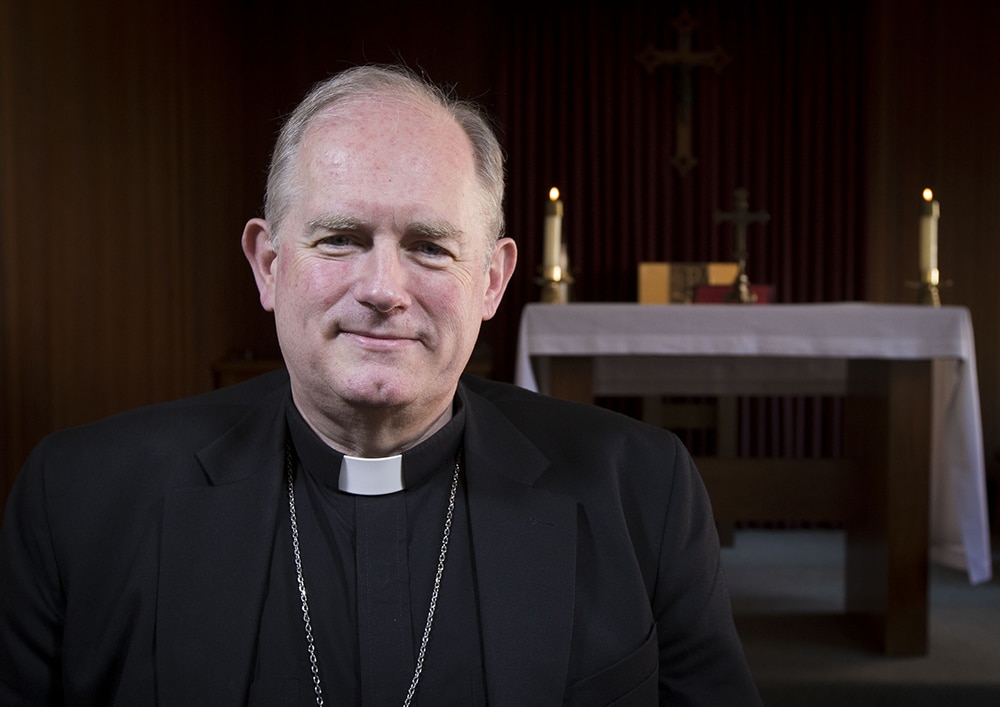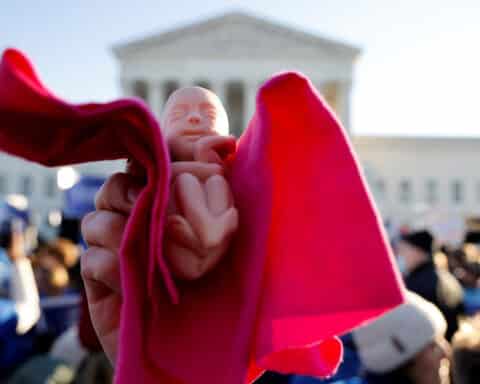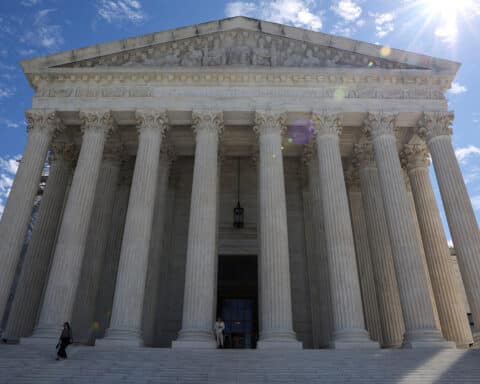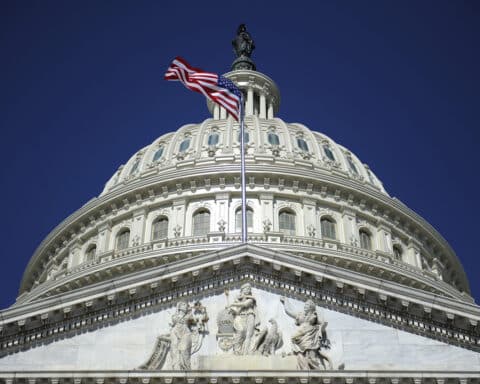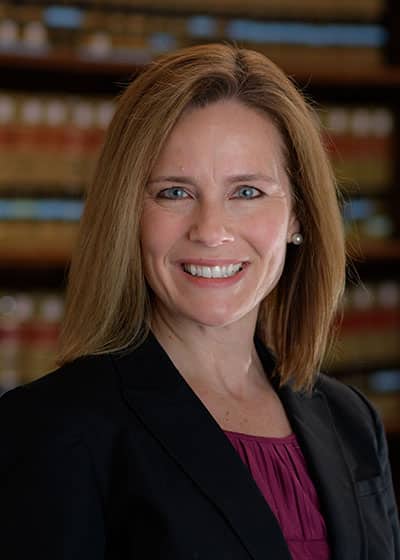
As U.S. Appellate Court Judge Amy Coney Barrett has become a top contender to replace the late Supreme Court Justice Ruth Bader Ginsburg — President Donald Trump said he will announce his pick later this week — there has been much talk about Barrett’s affiliation with the ecumenical, charismatic group, People of Praise, just as their was in 2018 when Barrett was a potential nominee. Much of the coverage, at best, mischaracterized the community. So, what is the truth? In 2018, Our Sunday Visitor spoke with Bishop Peter L. Smith, auxiliary bishop of Portland, Oregon, and one of the group’s most notable members, to get a better understanding of People of Praise.
Our Sunday Visitor: Fundamentally, how would you describe the People of Praise?
Bishop Peter L. Smith: We’re a lay movement and part of one of the new ecclesial movements in the Catholic Church since Vatican II. After Vatican II, there was an explosion in lay ministry and lay movements in the Catholic Church where the Vatican Council called on all Catholics, not just priests and religious, to embrace living lives of faith and holiness in ordinary life in the midst of the world, and that all Catholics were called to live this way. It actually started before Vatican II; Vatican II just sort of really opened the throttles on it. What you saw was lay people beginning to organize and beginning to live the mission and ministry of the Church in many different ways that they felt God was calling them to. It’s a wonderful example of how the Holy Spirit works in so many different and diverse ways to bring about great good in the life of the Church, in the life of people and in the world.
One of them was the Catholic Charismatic Renewal that came forward, which is the biggest single movement in the Catholic Church today. And what happens is, in the movements — and you see this in almost every movement in the Church — there are three sort of key things that usually happen. One is some sort of encounter, transformative experience — an encounter with God, Father, Son and Holy Spirit, however that is. When that happens, people’s faith life is transformed. And then you start to see a couple of other things that happen fairly soon thereafter. One is a desire for greater fraternity, community, fellowship. You feel a greater draw to other people of faith and others who have experienced an encounter with the Lord in this way, and then with that you see this impulse too: we’re called to do something.
Some Catholics feel called to live a deeper life of faith through those movements in addition to their parishes, and so you had this whole growth of movements in the Church that do very amazing things.
OSV: How do the People of Praise live this out?
Bishop Smith: First of all, our first call is to be a community, to live as brothers and sisters in the way that God has led us to while continuing to live in our homes and with our families and to experience our life of faith in our churches, parishes. And from there, to go out. In a broad sense our mission, so to speak — apart from living community life — is evangelization. And, to follow the lead of Pope Francis, in a sense, to go out to the peripheries and to serve the people on the peripheries. Proclaim Christ but also bring the love and the care of Jesus Christ to those who are most in need.
OSV: How would you describe the significance of it in a member’s life?
Bishop Smith: I think for most members it would be pretty significant in that we were living our lives of faith and going about our lives, often as very good Catholics. But then we had this encounter with the Lord, however that came about, and that began a journey, which led to us now being led to join together and to live our life of faith in a very intentional way. It impacts quite a bit of our lives. Now, we don’t abandon our jobs, we don’t move into a compound or anything like that. The normal situation is a family living in its home, people being employed in the world doing different things and so on. But our life of faith is much more present and intentional in how we live, if we’re doing it reasonably well.
OSV: If Judge Barrett is nominated to the Supreme Court, what could we learn about her priorities, knowing that she is a member of the People of Praise?
Bishop Smith: One of the things is you can count on the fact that she is a person of faith, and she’s made that clear. Another thing would be, I suspect, that she does her job with excellence, and I think that’s also fairly clear. In the People of Praise, the criticism of us caricatures us, this strange group. Yet in our schools we discuss evolution with the kids … and those kinds of things. What we teach the kids in our schools is to know how to think critically, not to just know the right answer. Because if they go on, into life, we want them to be at the very least good citizens in society, and at the most we want them to be people of faith wherever God may lead them and doing whatever God would want them to do. So, if Justice Barrett is nominated and is approved for the court, we would hope that she would conduct herself with integrity and be the best possible justice that she can be.
OSV: With the coverage associated with Judge Barrett, do you think there’s been any misrepresentation of the People of Praise in the media?
Bishop Smith: It’s one of those things: we don’t understand them and we don’t think we like them and, therefore, we categorize them in a way that they can be written off. And it’s unfortunate, but that’s a fundamental part of what’s going on in our culture and in our political system right now — where we decide we don’t like somebody, maybe they have different views from us … so we demonize them. The irony of all of this, in my mind, is that often it’s the folks who do this who, at a moment’s notice, demand toleration and understanding and kindness and forgiveness for their own choices and the way they live their life and demand that others accept them that way, but then they turn around and we get this. Now, we’re all sinners, and none of us is perfect, and we’ve all probably done things like that: asked others to live one way and then ourselves not live in that way. But it’s disappointing and saddening to see that, and I think in the long run — for folks who do that — it undermines their credibility, which is unfortunate because on some issues those folks have good things to say and good insights.
OSV: What was it that attracted you to the group?
Bishop Smith: I first bumped into two leaders from the People of Praise who were at a conference in South Africa, and one of them did a workshop on community life. And what fascinated me about it was these are people who are organized, committed to a pattern of life and who are serving with a purpose. And when I was doing my personal discernment, as I was finishing my university studies, much to my surprise, it seemed that the Lord was prompting me, nudging me to go and visit the People of Praise, so I did. And the first year I was in South Bend (Indiana) I lived with a family with six kids ,and then after that I joined the brothers, and I’ve lived with the brothers pretty much ever since.
OSV: And the brothers are a separate entity from the People of Praise in general, correct?
Bishop Smith: Yes. The People of Praise is essentially families and older and younger singles, ranging from college students to retirees and so on. What happened was a number of people, men and women, begin to discern God calling them to live dedicated lives of celibacy within the community. So then the community established a group of brothers and sisters for those folks. As we went along, we had a number of brothers in the group who went on to become priests and religious. (Because People of Praise is ecumenical), essentially what that means is you have to start a new association, a new community. We are canonically an association of the faithful in the Church. In the long run we hope to become a society of apostolic life. We live, we serve in different dioceses, but our priests are under the authority of the Archbishop of Portland for their priestly life and ministry and under the authority of the community for community life.
OSV: What has being a member of the People of Praise meant for you?
Bishop Smith: It’s because of my life in the People of Praise that I became a priest. … I am a far, far better priest and, hopefully, a better bishop because of my life in the People of Praise community than I would have been otherwise. If I had been ordained a priest without this part of my life, I probably would have done an OK job at best. But I think for me, so much of my priestly life and ministry comes from the pastoral care, pastoral training, the education, the formation and so on, the ongoing spiritual direction, the ongoing formation that I receive in the community, as well as from the seminary. So for me, it’s been something that has been a great blessing. I would not be the priest I have been or the bishop I am without that formation. I would have been a much poorer example of that. Some people may look at me today and say, “Well, you’re a poor excuse for one anyway,” and that may be true, but I would have been even poorer had I not been blessed by this.
Michael R. Heinlein is editor of Simply Catholic. Follow him on Twitter @HeinleinMichael.

